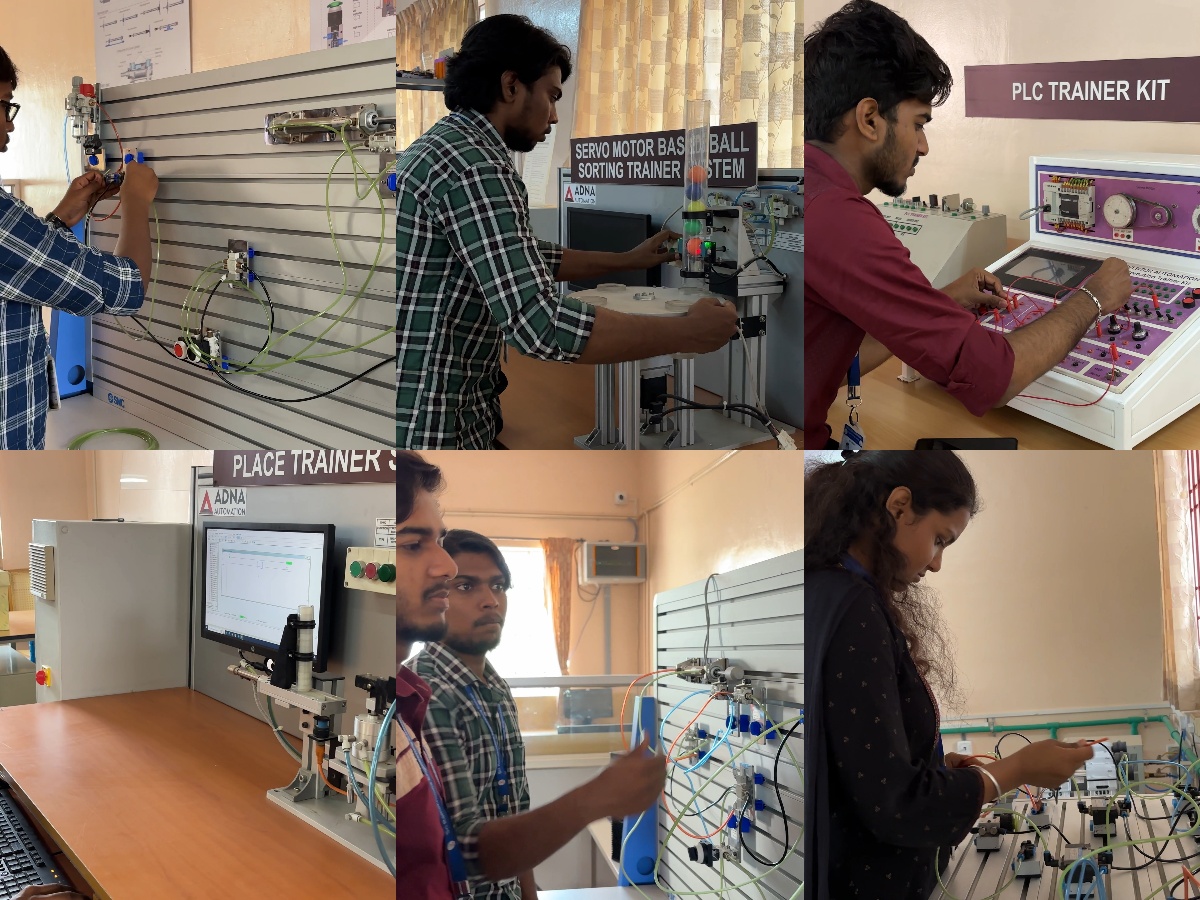

A four-year B.E UG programme on Robotics and Automation is launched in the silver jubilee year of the institution with an intake capacity of 60 students. It's a collaborative programme with Ariel University, Israel and L&T Technologies Services, Chennai and Craftsman Automation, Coimbatore are Industrial Knowledge partners for the programme. Robotics and Automation programme focuses on the design, construction, operation and use of autonomous and robotic devices, as well as the computer systems necessary for their control, sensory feedback and information processing. Through project based learning, design thinking, and inquiry learning, students will explore the processes and skills needed to design and fabricate physical devices that they will control or automate. Students are able to explore design of automation systems, mobile robotics and animatronics as well as traditional robotic devices. In addition, students will also develop the computational thinking and coding skills necessary to control their robotic or automated devices.


A four-year B.E UG programme on Robotics and Automation is launched in the silver jubilee year of the institution with an intake capacity of 60 students. It's a collaborative programme with Ariel University, Israel and L&T Technologies Services, Chennai and Craftsman Automation, Coimbatore are Industrial Knowledge partners for the programme. Robotics and Automation programme focuses on the design, construction, operation and use of autonomous and robotic devices, as well as the…Readmore
Welcome to the Department of Robotics and Automation of Sri Ramakrishna Engineering College, Coimbatore. The department is the newest department in our college and launched in the silver jubilee year of the institution with an intake capacity of 60 students offering Programme B.E. Robotics and Automation.In current climate, we often hear from technology entrepreneurs, futurists, and some media outlets, that robotics and automation will lead to a bright future. Robotic…Readmore

B.E., M.E., Ph.D
Let SREC be a stepping stone of your success.
VISION
1. To develop robotics and automation engineers with systems and interdisciplinary approach keeping pace with changing technologies.
MISSION
M1. To provide quality education through effective teaching learning process to meet the industry requirement
M2. To inculcate problem solving and lifelong learning skills through project based approach in collaboration with industries.
Programme Educational Objectives are to bring out graduates who will be able to demonstrate skills after few years of graduation.
PEO1: To equip young minds to as proficient engineers with a strong foundation fundamentals in robotics and automation with application of mathematics, science and engineering fundamentals.
PEO2: Excel in professional career by providing engineering solution, demonstrating technical competence by acquiring knowledge in the field of robotics and automation.
PEO3: Design, Develop, and Program a robot for a variety of engineering and societal applications using state of art tools and technologies and provide solution keeping in view of technically superior, economically feasible, environmentally compatible and socially acceptable.
Engineering Graduates will be able to:
PO1: Engineering knowledge: Apply the knowledge of mathematics, science, engineering fundamentals and an engineering specialization to the solution of complex engineering problems.
PO2: Problem analysis: Identify, formulate, review research literature, and analyze complex engineering problems reaching substantiated conclusions using first principles of mathematics, natural sciences, and engineering sciences.
PO3: Design/development of solutions: Design solutions for complex engineering problems and design system components or processes that meet the specified needs with appropriate consideration for the public health and safety, and the cultural, societal, and environmental considerations.
PO4: Conduct investigations of complex problems: Use research-based knowledge and research methods including design of experiments, analysis and interpretation of data, and synthesis of the information to provide valid conclusions.
PO5: Modern tool usage: Create, select, and apply appropriate techniques, resources, and modern engineering and IT tools including prediction and modeling to complex engineering activities with an understanding of the limitations.
PO6: The engineer and society: Apply reasoning informed by the contextual knowledge to assess societal, health, safety, legal and cultural issues and the consequent responsibilities relevant to the professional engineering practice.
PO7: Environment and sustainability: Understand the impact of the professional engineering solutions in societal and environmental contexts, and demonstrate the knowledge of, and need for sustainable development.
PO8: Ethics: Apply ethical principles and commit to professional ethics and responsibilities and norms of the engineering practice.
PO9: Individual and team work: Function effectively as an individual, and as a member or leader in diverse teams, and in multidisciplinary settings.
PO10: Communication: Communicate effectively on complex engineering activities with the engineering community and with society at large, such as, being able to comprehend and write effective reports and design documentation, make effective presentations, and give and receive clear instructions.
PO11: Project management and finance: Demonstrate knowledge and understanding of the engineering and management principles and apply these to one‘s own work, as a member and leader in a team, to manage projects and in multidisciplinary environments.
PO12: Life-long learning: Recognize the need for, and have the preparation and ability to engage
in independent and life-long learning in the broadest context of technological change.
These are specifically defined few objectives of the programme which make students realize the fact that the knowledge and techniques learnt in this Programme that has direct implication for the betterment of society and its sustainability.
PSO1: To design, develop, and implement automation systems that effectively integrate sensors, actuators, simulation tools, and control algorithms to address diverse real-world automation challenges.
PSO2: To program and integrate robotic systems for various applications, including robotic-driven industrial operations, robotics assembly, and autonomous navigation of robots in a broad spectrum of industrial sectors
PSO3: To pursue a successful career in automation through industry, entrepreneurship, and research, while fostering continuous improvement and contributing to technological advancement and societal well-being.